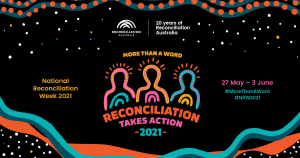
We would like to acknowledge the Kaurna and Peramangk people, the Traditional Custodians of the lands on which our team members live and work. We pay our respects to their Elders, past, present and emerging.
As our office reflects on the Reconciliation Week’s theme ‘more than a word’, we know that now more than ever every Aboriginal child and young person in care deserves to be connected with their culture.
With just over one in every 11 Aboriginal children in SA living in state care, we, as advocates, carers, social workers and everyone else who supports these young people, all have a role to play in connecting them with their identity. We could have every policy under the sun to tell us to do this but until we take action, these will just be words. Whether it’s sitting with a child to explore their family tree, attending cultural events with them or providing them opportunities to visit their lands, we need to work together so young Aboriginal people know who they are and where they are going.
We are privileged to share this candid conversation with you this week, between a university student who did an internship with us late last year and a young Aboriginal woman with a care experience. Together they talk about exploring identity while in care, the importance of connecting to family, and how action is needed to reconnect young Aboriginal people with their culture. This is an extract from their conversation. Our heartfelt thanks to the young woman for sharing her story, thoughts and dreams.
As a young person, what was it like for you exploring your identity whilst being in the care system?
My dad wasn’t on my birth certificate until I was 10 and nobody looked into the background of my mum. My mum’s a Kaurna woman and dad’s Nykina. Until my dad was put on my birth certificate there was no connection to culture or any Aboriginal identity.
[Connecting to culture] didn’t really happen until my dad stepped back in and he took me back to the lands and I got in touch with all of the traditions and the customs that my culture has. But finding identity, in general, is really hard in the care system.
Friends and school base your identity through consistency and that doesn’t happen often in care. When you’re being put in different homes in different situations constantly, it doesn’t help you form your identity. So you’re a bit lost in that whole part of your life.
What do you believe should have been different with the hindsight that you now possess?
Being able to be in touch with my culture, being able to have the freedom to be able to choose what I think is safe for me and not have somebody else feel like “this isn’t safe, she can’t do this”. Not being so limited and restricted.
Every kid stuffs up, every human stuffs up, and being able to learn from that and create a better future for yourself.
What would you like to see changed for Aboriginal kids in care or transitioning out of the system?
Less youth detention, less incarceration, less homelessness, and being connected to culture. Them knowing their mob 110%. Kids knowing who their family tree is. Being engaged with an Aboriginal worker, knowing their language. Being able to be back in their lands, being able to be in touch with their traditions, their dream time. Kids having that safe person who is in their community or outside the community but linked with their culture.
We need connection. Culture being at the forefront of every worker’s mind and their practices and actions so kids don’t feel like they’re an outcast in their own land. This is stolen land. A lot of people need to recognise that and wake up to the fact that colonisation did happen, and there is still a genocide. There’s still a Stolen Generation that’s going on today: Aboriginal kids getting put into white homes. Kids getting put into care and being institutionalised is another form of Stolen Generation. These facts need to be at the forefront of everybody’s practices.
We need to be able to stop the numbers climbing. We need to be making them decrease. Kids just being connected to their family members. All of that would be phenomenal to see, and to watch that change happen!
I feel like it would take decades, but at the same time, it’s worth the wait to be able to see these kids connected.
